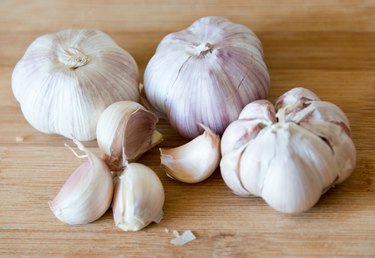
In most cases, the worst thing that can happen if you eat too much garlic is that you'll smell bad for the next few hours, but in a few instances there is indeed such a thing as too much garlic. So, what are garlic's side effects that you should be aware of?
Tip
Although there's no hard and fast rule about how many cloves of garlic you can eat in a day, any more than one clove could cause problems with blood clotting.
Video of the Day
Video of the Day
Health Properties of Garlic
Garlic is often hailed for its health benefits. As the National Center for Complementary and Integrative Health (NCCIH) explains, garlic is a plant that has been traditionally used for good health by such cultures as the Egyptians, Greeks, Romans, Chinese, Japanese and Native Americans.
Some of its touted benefits include lowering blood cholesterol, lowering blood pressure, preventing the common cold and even staving off cancer. Because of garlic's health-boosting aspects, it is even made into a dietary supplement — you can take it in pill form instead of eating it.
But as with many other foods and supplements, there can be too much of a good thing. Most people are familiar with garlic side effects of bad breath and body odor. In especially sensitive people, too much garlic can also cause heartburn and upset stomach, though both of these issues are more frequently observed when people eat raw garlic.
According to the University of Vermont Extension, garlic's primary beneficial component, allicin, is destroyed by heat, so garlic should be eaten raw to get the full benefits. People with stomach sensitivities should consume their raw garlic with other food to avoid heartburn and stomach aches.
Read more: 4 Diet Choices to Eliminate Body Odor
Of greater concern is the interference garlic can have on drugs and medications, though NCCIH explains that garlic is "probably safe" as long as you consume the amount you would typically eat in food. Too much garlic could lessen the effectiveness of saquinavir, a drug used to treat HIV infection. For people on blood thinners, too much garlic can increase the risk of bleeding.
Too Much Garlic?
But how much do you actually have to eat to see these negative garlic side effects like risk of bleeding?
Although University of Vermont Extension touts a clove a day keeps the doctor away, it discourages eating more than one clove because this excess amount is when garlic can start to interfere with anticoagulants.
According to Tufts University, there are no specific guidelines on how many cloves constitute too much garlic, but people who are having surgery or dental work, or people who have bleeding disorders, should consume garlic in moderation.
Maybe the best example of too much garlic is what is described in a review published in December 2016 in A&A Case Reports, which documents a patient who suffered excessive inoperative bleeding. According to the patient's wife, he was consuming about 12 grams of garlic a day, approximately 1 teaspoon with each of his three meals. He also had about 1 tablespoon of garlic with dinner the night before his surgery.
The study points out that more than 1 teaspoon of garlic powder a day might be enough to cause bleeding abnormalities, and that people who eat a lot of garlic should decrease their intake about a week or two before high-risk surgery.
For people who are not at risk of bleeding, the worst garlic side effects they need to stress over, according to the University of Vermont Extension, are garlic breath and flatulence.
Is this an emergency? If you are experiencing serious medical symptoms, please see the National Library of Medicine’s list of signs you need emergency medical attention or call 911.